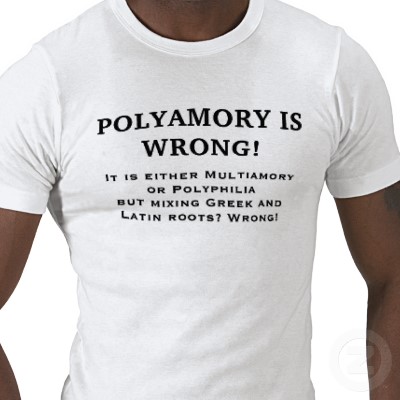| The following paper was written in 2006 for a Sociology 101 class taken at the Ohio State University. This paper discusses why cheating on a partner in a monogamous relationship is more accepted than polyamory relationships, (i.e. relationships where all partners agree that more than two partners can be in the relationship). The paper received the highest score and it was suggested that Dreama continue her research on this subject. Over the past year she has gathered a new sampling of opinions on this subject and is currently updating the paper for 2012. Stay tuned, as this new research will be posted later in the year. |
|
On any given day a person can turn on the television and find a show about infidelity; Jerry Springer, Maury Povich, Dr. Phil or Cheaters. These seedy programs draw audiences by the masses with women crying because their partners have cheated on them or men stomping off in a dumbfounded huff. More often than not the host always asks if forgiveness is an option.
American society appears to have accepted
cheating on a partner as comfortably as watching funny commercials between the
melodramatic segments. With all the cheating that is taking place it only seems
natural to have a follow up show on people involved in multi-partner
relationships, also known as polyamory. However, these types of
relationships based on awareness of the other partners do not frequent
television as often as cheating. Often times the audiences are appalled b A common misnomer made with the term polyamory is to call it “cheating.” A more in depth definition of this term is found in the article “Polyamorous Women, Sexual Subjectivity and Power,” by Elisabeth Sheff: Polyamory differs from swinging with its emphasis on long-term, emotionally intimate relationships and from adultery with its focus on honesty and (ideally) full disclosure of the network of sexual relationships to all who participate in or are affected by them. Both men and women have access to additional partners in polyamorous relationships, distinguishing them from polygamy (Sheff, 252). “Cheating” or “infidelity, in the context of a dyadic relationship, represents a partner’s violation of norms regulating the level of emotional or physical intimacy with people outside the relationship” (Drigotas, Barta, 177). Therefore, as long as all partners involved in the same polyamorous relationship are honest with one another it is not “cheating.”
|

 y
the lifestyle or suggest that those involved are living dangerously and
spreading disease. However, some of these relationships last many years (Matthesen,
6). Why is cheating on a partner while in a monogamous relationship more
accepted in American Society than polyamory relationships?
y
the lifestyle or suggest that those involved are living dangerously and
spreading disease. However, some of these relationships last many years (Matthesen,
6). Why is cheating on a partner while in a monogamous relationship more
accepted in American Society than polyamory relationships?